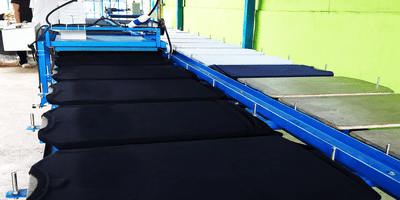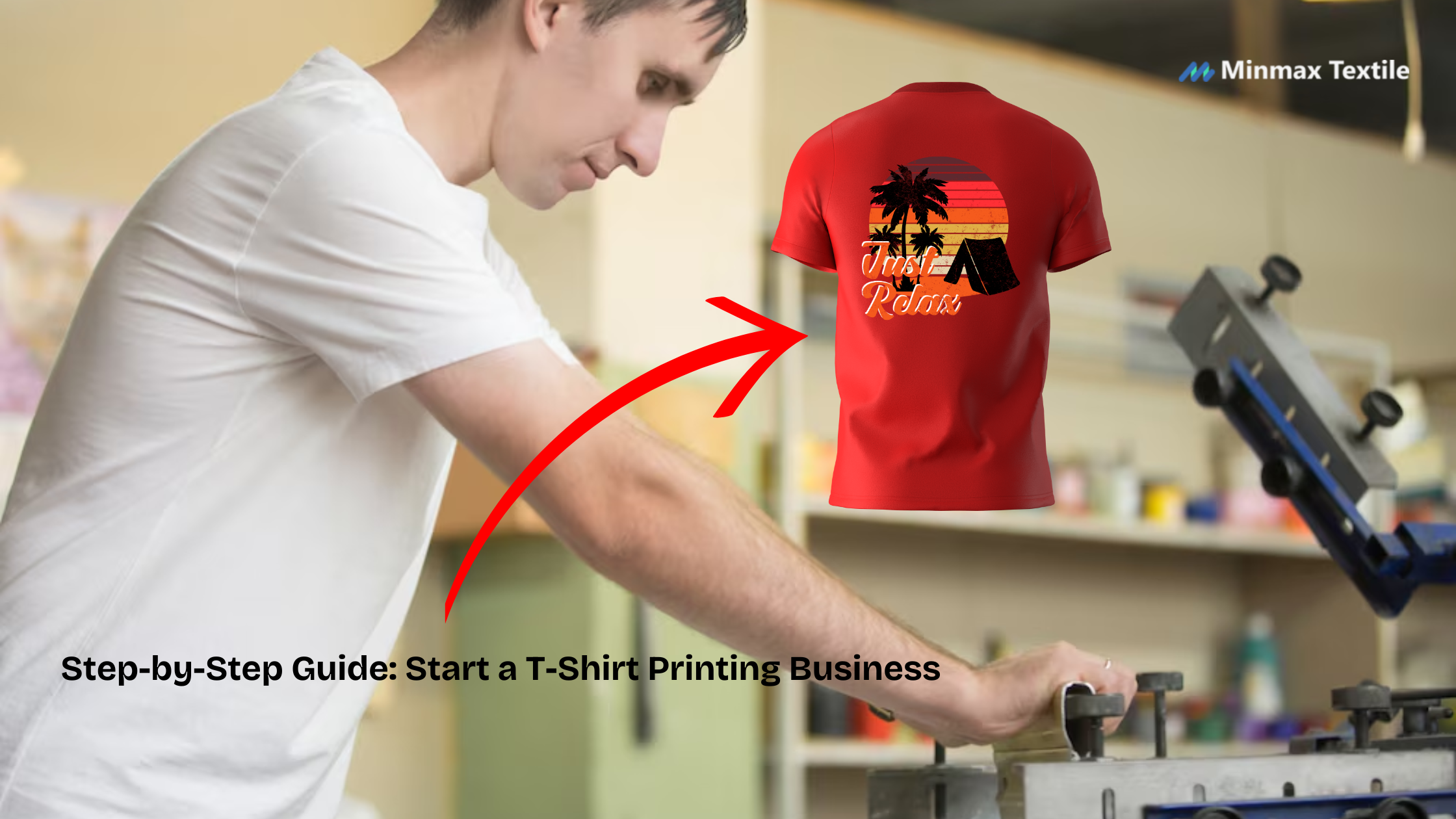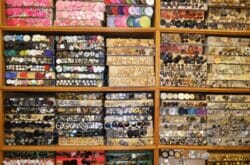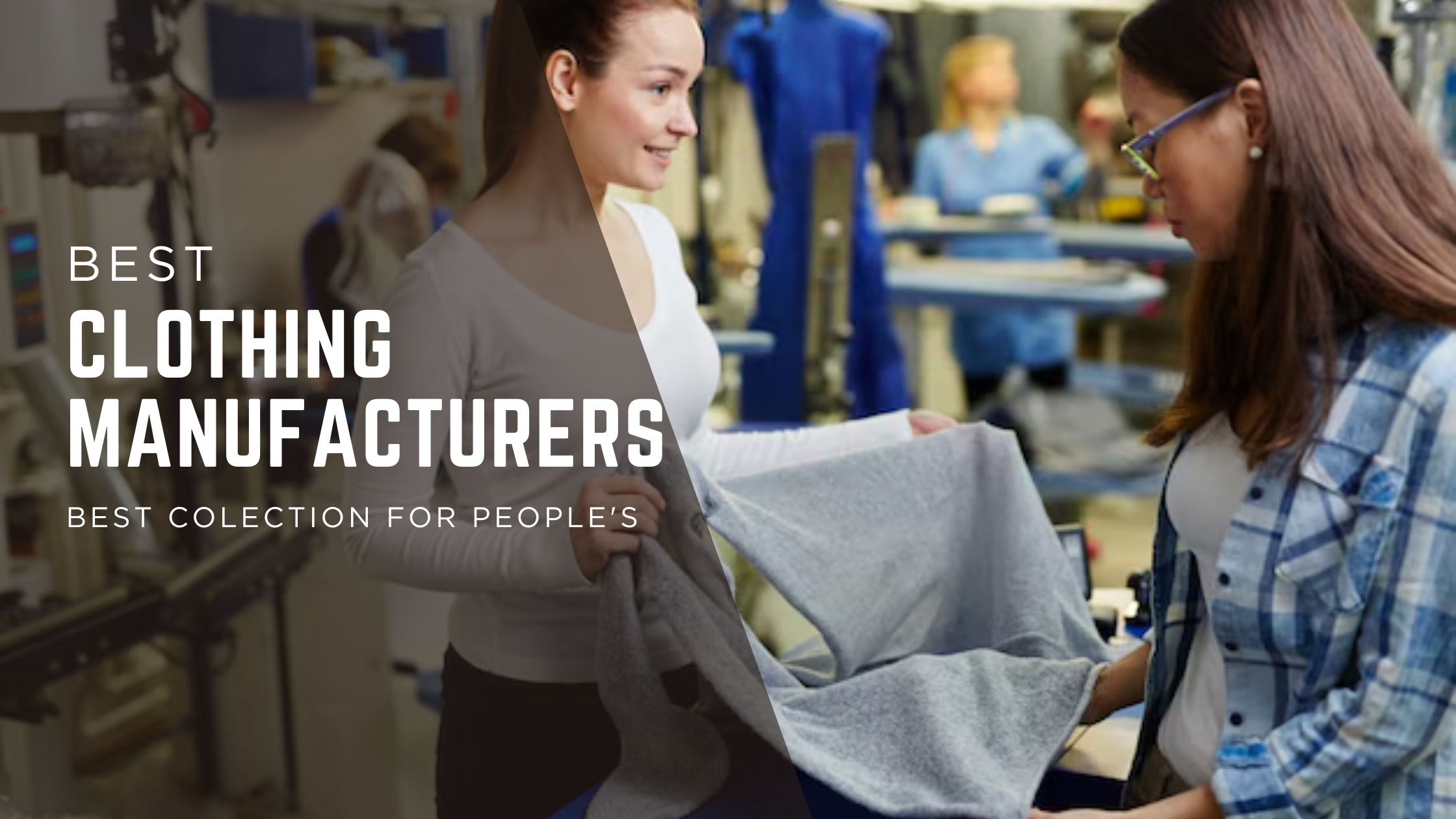The t-shirt industry has seen explosive growth over the past few decades, becoming a staple in fashion and personal expression. Whether it’s a casual day out, a promotional event, or a band merchandise, t-shirts are everywhere. But have you ever wondered what goes into making those t-shirts? Enter the world of t shirt manufacturing machine. These incredible devices have revolutionized the way we produce and customize t-shirts, making it easier and more efficient than ever before.
In this comprehensive guide, we’ll dive deep into everything you need to know about t shirt manufacturing machine. From understanding the different types of machines available to exploring their features, costs, and maintenance, we’ve got you covered. Whether you’re a budding entrepreneur looking to start your own t-shirt business or just curious about the technology behind your favorite tees, this guide is for you.
So, grab a cup of coffee, sit back, and let’s embark on this journey to uncover the fascinating world of t shirt manufacturing machine!
What is a T Shirt Manufacturing Machine?
At its core, a t shirt manufacturing machine is a device used to create and customize t-shirts. These machines range from simple manual setups to complex automated systems, each designed to handle different aspects of t-shirt production. But why are they so important?
Imagine trying to manually print hundreds of t-shirts for an event. The sheer amount of time, effort, and inconsistency would be overwhelming. T shirt manufacturing machine streamline the process, ensuring high-quality prints, consistent results, and increased efficiency. They have become the backbone of the t-shirt industry, enabling businesses to meet the high demand for custom apparel.
Key Components of a T Shirt Manufacturing Machine
- Printing Mechanism: This is where the actual printing happens. It could be screen printing, direct-to-garment (DTG), or heat press.
- Control Panel: Allows users to control various settings like temperature, pressure, and print design.
- Conveyor System: Used in automated machines to move t-shirts through different stages of production.
- Drying System: Ensures the prints are properly cured and set on the t-shirt.
- Frames and Screens: Used in screen printing machines to hold the design stencils.
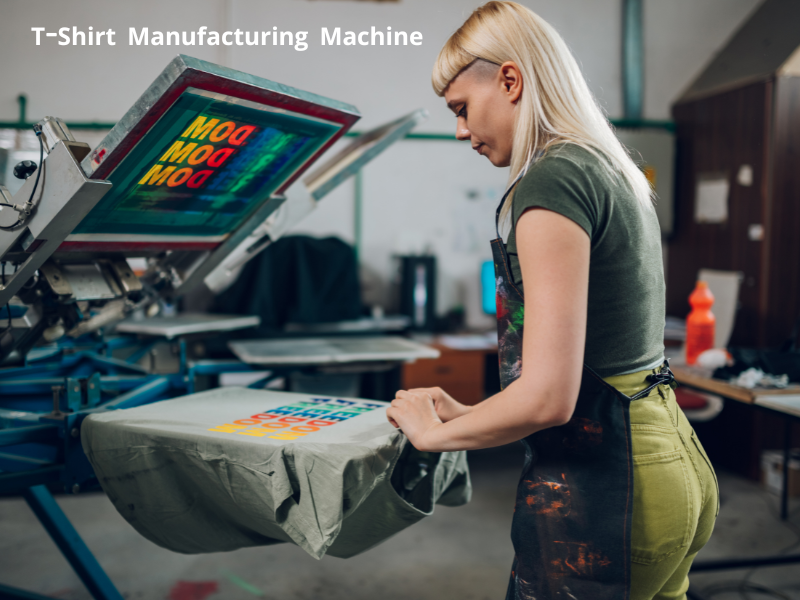
Different Types of T-Shirt Manufacturing Machines
- Screen Printing Machines: Ideal for bulk printing.
- Direct-to-Garment (DTG) Printers: Perfect for high-quality, detailed prints.
- Heat Press Machines: Versatile and commonly used for vinyl prints.
- Embroidery Machines: Adds a touch of class with embroidered designs.
- Sewing Machines: Essential for stitching and assembling t-shirts.
Understanding these components and types is crucial in choosing the right machine for your needs.
1.Screen Printing Machines
Screen printing is one of the oldest and most popular methods of t-shirt printing. It involves creating a stencil (or screen) and using it to apply layers of ink on the t-shirt. This method is especially effective for large quantities of t-shirts with simple designs.
How Screen Printing Works
Screen printing involves several steps:
- Design Creation: The design is created and separated into different colors.
- Screen Preparation: Screens are prepared for each color in the design.
- Ink Application: Ink is applied to the screens and pressed through onto the t-shirt.
- Drying: The printed t-shirts are dried to set the ink.
Advantages and Disadvantages
Advantages:
- Cost-effective for large batches
- Durable prints that withstand many washes
- Vibrant colors with thick ink layers
Disadvantages:
- Not ideal for complex or multi-colored designs
- Setup time can be lengthy
- Requires significant space for equipment
Best Screen Printing Machines on the Market
|
Brand |
Model | Features |
Price Range |
|
M&R |
Sportsman EXG | Automatic press, high speed | $30,000 – $50,000 |
|
Vastex |
V-2000HD | Modular, manual press, easy to use |
$5,000 – $15,000 |
| Riley Hopkins | 300 Press | Durable, multi-station |
$2,000 – $10,000 |
??
2.Direct-to-Garment (DTG) Printers
Direct-to-Garment (DTG) printing is a relatively new method that allows for detailed, high-quality prints directly onto the fabric. This technology is perfect for short runs and highly detailed designs.
How DTG Printing Works
- Design Preparation: Digital designs are created and adjusted for printing.
- Pre-treatment: The t-shirt is treated to ensure ink adhesion.
- Printing: The design is printed directly onto the fabric using inkjet technology.
- Curing: The printed t-shirt is dried and cured to set the ink.
Advantages and Disadvantages
Advantages:
- High-quality prints with fine details
- Great for small orders or custom designs
- No setup time required for different designs
Disadvantages:
- Slower printing speed compared to screen printing
- Higher cost per print
- Requires pre-treatment and maintenance
Best DTG Printers on the Market
|
Brand |
Model | Features |
Price Range |
|
Epson |
SureColor F2100 | High-speed, vibrant colors, easy to use |
$15,000 – $20,000 |
|
Brother |
GTX Pro | High resolution, fast printing, eco-friendly |
$20,000 – $25,000 |
|
Ricoh |
Ri 1000 | Versatile, high-quality, user-friendly |
$10,000 – $15,000 |
??
3.Heat Press Machines
Heat press machines are versatile tools that use heat and pressure to transfer designs onto t-shirts. They are commonly used for vinyl transfers, sublimation, and even screen-printed transfers.
How Heat Press Machines Work
- Design Preparation: Design is cut from vinyl or printed on transfer paper.
- Heat Press Setup: The machine is set to the required temperature and pressure.
- Application: The design is placed on the t-shirt and the heat press is applied.
- Cooling: The t-shirt is allowed to cool, setting the design.
Advantages and Disadvantages
Advantages:
- Versatile for different types of prints
- Easy to use and setup
- Cost-effective for small runs
Disadvantages:
- Time-consuming for large orders
- Limited to certain types of designs
- Durability may vary with materials used
Best Heat Press Machines on the Market
|
Brand |
Model | Features |
Price Range |
|
Cricut |
EasyPress 2 | Compact, portable, easy to use |
$200 – $500 |
|
PowerPress |
Industrial-Quality | High pressure, large surface area |
$300 – $700 |
|
Fancierstudio |
Power Heat Press | Affordable, good for beginners |
$150 – $400 |
??
4.Embroidery Machines
Embroidery machines add a touch of elegance and sophistication to t-shirts with intricate stitching patterns. They are ideal for logos, monograms, and decorative designs.
How Embroidery Machines Work
- Design Creation: The design is digitized into a format readable by the machine.
- Machine Setup: Threads and stabilizers are set up in the machine.
- Embroidery Process: The machine stitches the design onto the fabric.
- Finishing: Excess threads are trimmed and the design is inspected.
Advantages and Disadvantages
Advantages:
- High perceived value due to detailed stitching
- Durable and long-lasting designs
- Professional appearance
Disadvantages:
- Higher initial cost for machines
- Time-consuming for detailed designs
- Limited to certain design types
Best Embroidery Machines on the Market
|
Brand |
Model | Features |
Price Range |
|
Brother |
SE1900 | Combo machine, 138 built-in designs |
$1,000 – $1,500 |
|
Janome |
Memory Craft 500E | Large embroidery area, user-friendly |
$1,500 – $2,500 |
|
Bernina |
Bernette B79 | Touchscreen, multiple functions |
$1,800 – $3,000 |
??
5.Sewing Machines
Sewing machines are essential for the assembly of t-shirts, from stitching the seams to attaching labels. They ensure the structural integrity of the garment.
How Sewing Machines are Used in T-Shirt Manufacturing
- Cutting: Fabric pieces are cut into t-shirt shapes.
- Stitching: Pieces are stitched together using a sewing machine.
- Finishing: Edges are hemmed, and labels are attached.
Advantages and Disadvantages
Advantages:
- Essential for garment construction
- Versatile for various sewing tasks
- Relatively low cost
Disadvantages:
- Requires skill and practice to master
- Time-consuming for large batches
- Maintenance needed to keep machines running smoothly
Best Sewing Machines for T-Shirt Manufacturing
|
Brand |
Model | Features |
Price Range |
|
Singer |
Heavy Duty 4452 | High speed, durable, affordable | $200 – $400 |
|
Brother |
CS6000i | Versatile, computerized, user-friendly |
$150 – $300 |
|
Janome |
HD3000 | Heavy duty, easy to use |
$300 – $500 |
Key Features to Look for in a T Shirt Manufacturing Machine
Choosing the right t-shirt manufacturing machine involves considering several key features that will affect your production process and the quality of your final product. Here are some crucial aspects to look for:
- Print Quality and Resolution: The quality of the print is paramount. Look for machines that offer high resolution and vibrant colors to ensure your designs stand out. DTG printers, for example, are known for their excellent print quality and ability to capture intricate details.
- Speed and Efficiency: If you plan to produce large quantities of t-shirts, speed and efficiency are critical. Screen printing machines are typically faster for bulk orders, while DTG printers might be slower but offer superior quality. Consider your production needs when evaluating speed.
- Ease of Use and Maintenance: A user-friendly machine can save you a lot of time and frustration. Look for machines with intuitive interfaces, easy setup, and straightforward maintenance procedures. Regular maintenance is necessary to keep your machine in top condition and prolong its lifespan.
- Cost and Return on Investment: Budget is always a concern. Compare the initial cost of the machine with its expected return on investment (ROI). More expensive machines may offer better features and durability, leading to long-term savings. However, ensure that the machine fits within your budget and production scale.
- Versatility and Adaptability: The ability to adapt to different printing methods and materials can be a significant advantage. Some machines are versatile and can handle multiple types of printing, while others are specialized. Evaluate your needs and choose a machine that can grow with your business.
Step-by-Step Process of Using a T Shirt Manufacturing Machine
Using a t-shirt manufacturing machine involves several steps, from preparing your design to finishing the printed t-shirt. Here’s a detailed look at the process:
1.Preparing the Design
Before you start printing, you need to prepare your design. This might involve creating or editing the design using graphic design software. Ensure the design is in the correct format and resolution for the type of printing you are using.
2.Setting Up the Machine
Each type of t-shirt manufacturing machine has its setup requirements. For screen printing, this involves preparing the screens and ink. For DTG printing, you need to load the t-shirt and ensure it is pre-treated. Follow the manufacturer’s instructions for setup to ensure optimal results.
3.Printing the T-Shirt
With the design ready and the machine set up, it’s time to print. This step varies depending on the machine:
- Screen Printing: Apply the ink through the screens onto the t-shirt.
- DTG Printing: Print the design directly onto the fabric using inkjet technology.
- Heat Press: Use heat and pressure to transfer the design onto the t-shirt.
4.Post-Printing Processes
After printing, the t-shirt needs to be cured or dried to set the design. This might involve using a heat press, conveyor dryer, or simply air drying, depending on the type of print.
5.Quality Control and Inspection
Finally, inspect the printed t-shirts for any defects or inconsistencies. Ensure that the prints are properly aligned, the colors are accurate, and the overall quality meets your standards. This step is crucial to maintain customer satisfaction and uphold your brand’s reputation.
Top Brands and Models of T-Shirt Manufacturing Machines
The market for t-shirt manufacturing machines is vast, with numerous brands offering a wide range of models. Here are some of the top brands and their standout models:
|
Brand |
Model | Features |
Price Range |
|
Brother |
GTX Pro | High resolution, fast printing, eco-friendly | $20,000 – $25,000 |
|
Epson |
SureColor F2100 | High-speed, vibrant colors, easy to use |
$15,000 – $20,000 |
|
M&R |
Sportsman EXG | Automatic press, high speed |
$30,000 – $50,000 |
|
Vastex |
V-2000HD | Modular, manual press, easy to use |
$5,000 – $15,000 |
| Singer | Heavy Duty 4452 | High speed, durable, affordable |
$200 – $400 |
These brands are known for their reliability, quality, and innovation in the t-shirt manufacturing industry. When choosing a machine, consider the features, cost, and support offered by these brands.
Cost of T-Shirt Manufacturing Machines
The cost of t-shirt manufacturing machines can vary widely based on the type, brand, and features. Here’s a breakdown of the typical price ranges for different types of machines:
|
Type of Machine |
Price Range |
|
Screen Printing |
$2,000 – $50,000 |
|
DTG Printers |
$10,000 – $25,000 |
|
Heat Press |
$150 – $700 |
| Embroidery Machines |
$1,000 – $3,000 |
| Sewing Machines |
$150 – $500 |
??Factors Affecting the Cost
- Technology and Features: More advanced machines with additional features tend to be more expensive.
- Brand and Quality: Reputable brands often come with a higher price tag but offer better durability and support.
- Production Volume: Machines designed for high-volume production are typically more costly.
Tips for Budgeting and Financing
- Determine Your Needs: Understand your production volume and the types of prints you need to decide on the appropriate machine.
- Compare Options: Research different brands and models to find the best fit for your budget.
- Consider Financing Options: Many suppliers offer financing plans to help spread out the cost of the machine.
Maintenance and Troubleshooting of T-Shirt Manufacturing Machines
Proper maintenance and troubleshooting are essential to keep your t-shirt manufacturing machine running smoothly and prolong its lifespan. Here are some tips and common issues to watch out for:
Regular Maintenance Practices
- Clean the Machine: Regularly clean the machine, especially the printing heads and screens, to prevent ink buildup and clogs.
- Check for Wear and Tear: Inspect the machine for any worn-out parts and replace them as needed.
- Lubricate Moving Parts: Ensure that all moving parts are properly lubricated to prevent friction and damage.
- Update Software: Keep the machine’s software up to date to ensure optimal performance and access to the latest features.
Common Issues and Their Solutions
- Clogged Print Heads: Clean the print heads regularly and use high-quality ink to prevent clogs.
- Misaligned Prints: Check the alignment settings and ensure the t-shirt is properly loaded onto the machine.
- Ink Smudging: Ensure the ink is properly cured and adjust the drying settings if necessary.
- Machine Jamming: Clear any obstructions and ensure the machine is properly maintained to prevent jams.
When to Seek Professional Help
- Frequent Malfunctions: If the machine frequently malfunctions despite regular maintenance, it may need professional servicing.
- Complex Repairs: For complex issues that require specialized knowledge, it’s best to contact the manufacturer or a professional technician.
Benefits of Investing in a T Shirt Manufacturing Machine
Investing in a t-shirt manufacturing machine offers several benefits that can help grow your business and improve your product quality:
- Increased Production Efficiency: A high-quality t-shirt manufacturing machine can significantly speed up your production process, allowing you to produce more t-shirts in less time. This efficiency is crucial for meeting customer demands and expanding your business.
- Higher Quality Products: Machines like DTG printers and embroidery machines produce high-quality, detailed prints that are difficult to achieve manually. This improved quality can enhance your brand’s reputation and attract more customers.
- Cost Savings in the Long Run: While the initial investment may be substantial, a good t-shirt manufacturing machine can save you money in the long run by reducing labor costs, minimizing errors, and increasing production efficiency.
- Flexibility in Design and Production: Modern t-shirt manufacturing machines offer great flexibility, allowing you to produce a wide range of designs and styles. This adaptability is essential for staying competitive in the dynamic fashion industry.
- Future Trends in T-Shirt Manufacturing Technology: The t-shirt manufacturing industry is continuously evolving, with new technologies and trends shaping the future of production. Here are some trends to watch out for:
Advancements in Machine Technology
- Automation: Increased automation in machines can streamline production and reduce the need for manual intervention.
- Artificial Intelligence: AI-powered machines can optimize the printing process, improving quality and efficiency.
- 3D Printing: Emerging 3D printing technology could revolutionize garment production with more complex and customizable designs.
Sustainability and Eco-Friendly Practices
- Eco-Friendly Inks: The use of water-based and biodegradable inks is becoming more popular.
- Sustainable Materials: Machines that can handle organic and recycled fabrics are in demand.
- Energy Efficiency: Newer machines are designed to be more energy-efficient, reducing the environmental impact.
Customization and Personalization Trends
- On-Demand Printing: The ability to print custom designs on-demand allows businesses to offer personalized products without maintaining large inventories.
- Interactive Designs: Technology that enables customers to design their own t-shirts online is gaining popularity.
Final Words
Choosing the right t-shirt manufacturing machine is a critical decision that can significantly impact your business. Whether you’re just starting out or looking to upgrade your existing equipment, understanding the different types of machines, their features, and maintenance requirements is essential. Investing in a high-quality machine can increase your production efficiency, improve product quality, and ultimately boost your profitability.
We hope this comprehensive guide has provided you with valuable insights into the world of t-shirt manufacturing machines. Remember, the key to success is to stay informed, choose wisely, and keep adapting to the latest trends and technologies in the industry.
FAQs
1.What is the best t-shirt manufacturing machine for small businesses?
For small businesses, a Direct-to-Garment (DTG) printer or a Heat Press machine is often the best choice due to their versatility and lower initial cost.
2.How long does a t-shirt manufacturing machine last?
The lifespan of a t-shirt manufacturing machine depends on the type and how well it is maintained. On average, machines can last anywhere from 5 to 15 years with proper care.
3.Can I use one machine for multiple types of printing?
Some machines, like heat press machines, are versatile and can handle various types of printing, including vinyl transfers and sublimation. However, specialized machines like screen printers and DTG printers are optimized for specific printing methods.
4.What are the most common maintenance issues?
Common maintenance issues include clogged print heads, misaligned prints, and machine jams. Regular cleaning, proper setup, and following the manufacturer’s maintenance guidelines can prevent most of these problems.
5.How much does it cost to maintain a t-shirt manufacturing machine?
Maintenance costs vary depending on the type of machine and the extent of the maintenance required. Routine maintenance like cleaning and replacing parts can cost a few hundred dollars annually, while more extensive repairs may be more expensive.
